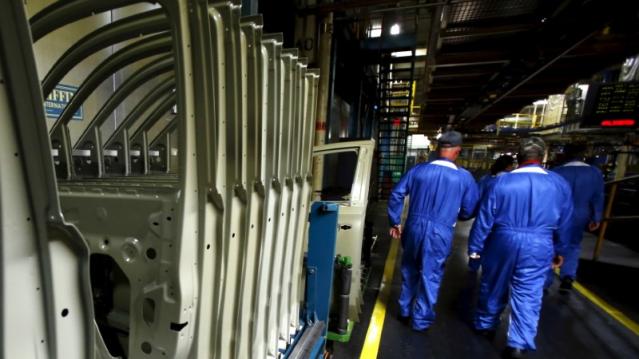Why GM Should Send a Thank You Note to Saudi Arabia

General Motors shares are up more than 4 percent Thursday after the automaker reported better-than-expected profits. The company earned more than $1 billion in profits last quarter, well above Wall Street’s forecasts.
A big reason for the blowout quarter was record margins in North America, thanks in large part to increased sales of trucks and SUVs. The headline at the Detroit Free Press says it all: “GM earns $1.1B in Q2 as pickup, SUV sales surge in U.S.”
Related: What's Next for Oil Prices? Look Out Below!
As a general rule, big pickup trucks and SUVs deliver higher profit margins than smaller, cheaper cars, so Detroit is always happy when large vehicles are selling. Another general rule seems to be that when gas is cheap, Americans start dreaming about gas-guzzling vehicles of all kinds, from blinged-out GMC Yukon XL Denalis to fuel-blasting Chevy Camaro ZL1s. And gas certainly has been cheap lately, thanks in large part to Saudi Arabia’s decision to maintain crude oil production levels in the face of increased U.S. production and a global slowdown in demand for energy.
Here’s a chart of gas and oil prices over the last three years, courtesy of GasBuddy. Note the steep decline starting in 2014:

As long as oil and gas are cheap, GM can probably count on selling lots of its most profitable vehicles. And with China slowing and Iran rejoining the global oil market, cheap fuel may be here for a while.
Top Reads from The Fiscal Times:
- 7 Revelations from Donald Trump’s Financial Disclosure
- The New Generation of ‘Genuinely Creepy’ Electronic Devices
- The Best Things to Charge on Your Credit Card
Quote of the Day: A Big Hurdle for the Tax Cuts

“He goes in and campaigns on an issue, and the challenge is he then talks about executing drug dealers. Why do you think the press is going to cover the tax cuts if you’ve given them the much more exciting issue?”
-- Grover Norquist, president of tax-cutting advocacy group Americans for Tax Reform, on President Trump’s failure to sell the tax law.
The Obamacare Mandate That Could Produce $12 Billion in Fines in 2018

Republicans effectively eliminated the individual Obamacare mandate in the tax package signed late last year. Although the new regulation reducing the mandate penalty to zero doesn’t take effect until 2019, President Trump has cited the rule change as a victory over the health law so many conservatives oppose. “Essentially, we are getting rid of Obamacare. Some people would say, essentially, we have gotten rid of it," Trump told a crowd in Michigan two weeks ago.
However, many parts of the Affordable Care Act are still in effect and will continue to operate even after the individual mandate is eliminated in 2019.
In particular, the employer mandate, which requires companies with more than 50 employees to offer health benefits or face fine of roughly $2,000 per worker, will continue to play a significant role in the Obamacare system. The Congressional Budget Office estimates that the mandate will produce more than $12 billion in fines in 2018 alone.
Some conservative groups are pushing lawmakers to stop enforcing the employer mandate, but the IRS is still working to enforce the law. According to The New York Times Monday, the IRS is sending out notices to more than 30,000 businesses that have failed to comply.
Chart of the Day: It’s Still the Economy, Stupid

Security may be the top policy issue for Republican voters, but the economy is the top concern for Democrats, independents and voters overall, according to Morning Consult’s latest polling on the midterm elections. Health care is third on the list, followed by “seniors’ issues.” The results are based on surveys with more than 275,000 registered U.S. voters from February 1 to April 30.
Number of the Day: $13 Billion

An analysis by Bloomberg finds that the roughly 180 companies in the S&P 500 that have reported earnings for the first three months of the year saved almost $13 billion thanks to the corporate tax cut enacted late last year. Those companies’ effective tax rate dropped by more than 6 percentage points on average. About a third of the tax savings went to 44 financial firms.
How a Florida Doctor with Social Ties to Trump Delayed a $16B Billion VA Project

A West Palm Beach doctor who is friends with Ike Perlmutter, the chairman of Marvel Entertainment and an informal adviser to President Trump on veterans’ issues, has held up “the biggest health information technology project in history — the transformation of the VA’s digital records system,” Politico’s Arthur Allen reports. Dr. Bruce Moskowitz “objected to the $16 billion Department of Veterans Affairs project because he doesn’t like the Cerner Corp. software he uses at two Florida hospitals, according to four former and current senior VA officials. Cerner technology is a cornerstone of the VA project. … Moskowitz’s concerns effectively delayed the agreement for months, the sources said.” Read the full story.

